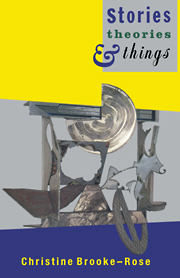Book contents
- Frontmatter
- Contents
- Preface
- Acknowledgements
- Part I Theories as stories
- Part II Stories and style
- 4 A for but: Hawthorne's ‘The Custom-House’
- 5 Ill locutions
- 6 Ill logics of irony
- 7 Ill wit and sick tragedy
- 8 Cheng Ming Chi'I'd
- 9 Notes on the metre of Auden's The Age of Anxiety
- Part III Theories of stories
- Part IV Things?
- References
- Index
8 - Cheng Ming Chi'I'd
Published online by Cambridge University Press: 20 August 2009
- Frontmatter
- Contents
- Preface
- Acknowledgements
- Part I Theories as stories
- Part II Stories and style
- 4 A for but: Hawthorne's ‘The Custom-House’
- 5 Ill locutions
- 6 Ill logics of irony
- 7 Ill wit and sick tragedy
- 8 Cheng Ming Chi'I'd
- 9 Notes on the metre of Auden's The Age of Anxiety
- Part III Theories of stories
- Part IV Things?
- References
- Index
Summary
By dealing in detail with three traditional male novelists, and more particularly with the problem of Represented Thought, I have in this Section tried to show how important apparently minor elements of style can become in the interpretation of Story. But there are other ways of telling stories than the prose novel, and although I shall be returning to this (my main theme), in the next Sections, I would like to end this one by considering two texts by two Modernist poets, Pound (here) and Auden (Ch. 9), also from a very particular stylistic point of view.
The Cantos tells a story too, but in a very different, non-narrative way, although there are narratives in them. And the Pound story is itself a huge and complex one, which includes the story of a style that was a lifetime developing towards adequacy to its vast material, a style, moreover, that altered the English poetic language more profoundly than any other in the twentieth century.
Critical interpretations sometimes misread, misrepresent, misunderstand stylistic features, but nothing can do this as thoroughly as translation does, especially for poetry, which uses language in a very specific way. Poetry is what gets lost in translation, said Frost, and style is the man, said Buffon; these two statements together are the best affirmation that language is of the essence. And yet the French translation of The Cantos that marked the centenary of Pound's birth in 1985 is nothing short of a scandal. I would like to show how.
- Type
- Chapter
- Information
- Stories, Theories and Things , pp. 123 - 142Publisher: Cambridge University PressPrint publication year: 1991

